- Home
- Fannie Flagg
The Wonder Boy of Whistle Stop Page 19
The Wonder Boy of Whistle Stop Read online
Page 19
“You do?”
“Sure. We’ll start with a few little housing developments, and with the right kind of advertising, I don’t think we can miss.”
When they went inside the old cafe building, Bud stood there for a moment and looked around. “My God, I haven’t been in this room for over sixty-something years. I can’t believe we’re both still standing.”
Ruthie said, “I was looking for something to do, so after it’s all been redone, I’m going to move into the back room, and manage it.”
Ruthie then told him how she planned to re-create the exterior and interior of the cafe, just as it had been in the 1930s. “People love that sort of old-time campy look.”
Bud said, “I can help you there, Ruthie. I can remember exactly where everything was. The old piano was right over in the corner. And a deer head was right up there.”
Evelyn laughed. “Well Ruthie, it looks like you have your creative assistant.”
Before they left the cafe, they showed Bud all the old photos they had found. He looked at them one by one and said, “Oh my God, there’s little Chester, I haven’t thought about him in years.”
“What we want to know is, who was little Chester?”
Bud laughed. “Just a friend of mine. We used to be pen pals.”
Ruthie shook her head. “Only you, Daddy, would have a dummy for a pen pal.”
They made a stop at the cemetery to visit Idgie’s, Ruth’s, and Ninny’s graves. Then later they walked him around the area, and showed him all the different houses they were planning to restore. The last house they showed him was in pretty bad disrepair and all the paint was gone, but when Bud saw it he said, “Oh my gosh. This is Aunt Ninny and Uncle Cleo’s old house. Oh my gosh. I spent many an hour over here. Aunt Ninny used to read the funny papers to us kids, right up there on the porch.”
They headed up the steps to the front door, and Ruthie said, “Daddy, wait. Before we go inside, I have something I want you to have.” She handed him the key to the front door and said, “Happy Birthday, Daddy, from both of us.”
Bud stared at the key and then looked back at Ruthie. “I don’t understand.”
“The house is yours. It’s your birthday present.”
“You don’t mean it.” He looked at Evelyn.
Evelyn said, “Yes, she does. And we are going to fix it up just for you…and Virgil, of course.”
Bud was astounded. “You mean, I don’t have to stay at Briarwood anymore?”
“No, Daddy. This is your home, if you want it. What do you say?”
“Well, I just don’t know what to say. You gals are about to give me a heart attack.”
Evelyn said, “You’d better say yes. Will you come?”
“Will I? When can I move in?”
“Just as soon as we can get it finished,” said Evelyn.
“I still can’t believe it. Ruthie, when can I tell Merris I’m leaving?”
“We don’t have a firm date yet, but we’ll have them work as fast as they can.”
“Oh my, I never thought I’d see Whistle Stop again. And now I’m gonna be living here.”
His eyes suddenly filled with tears. “Ruthie, Evelyn, I guess this is about the best present I ever got.”
* * *
—
RUTHIE KNEW IT was going to be a lot of hard work getting everything done, but seeing her father’s face light up as it had when he saw Whistle Stop again would make it all worth it. Although Bud never said so, she realized from his reaction today just how unhappy he had been living at Briarwood. She hadn’t seen him so excited about something in a long time. Thank heavens she was going to be able to get him out and bring him back home where he belonged. She wanted his last years to be happy ones.
Over the next few weeks Evelyn and Ruthie were having a lot of fun with the plans to redo Ninny’s old house for Bud. It was going to be the same as it had been, except now it would have a brand-new walk-in tub and shower, and be wheelchair accessible, just in case he needed it at some time in the future. The architect also drew up plans for a small apartment in the back for a caregiver, in case the time came when he might need one. Bud was calling almost every day from Atlanta, wanting to know how everything was coming along. Ruthie was excited and champing at the bit to start, and get him moved into his new house. But then something unexpected happened.
Bud might not be moving home after all.
WHISTLE STOP, ALABAMA
2017
IT HAD TAKEN a while, but by now almost all of the building permits had been pulled and the project was finally getting ready to move ahead full steam. Today, they were preparing to start the restoration of the cafe. The crew was up in the attic, checking for any structural damage they might need to shore up before they began, busy examining all the wooden rafters with flashlights, when the contractor in charge walked in and called them down. “Pack up your tools, boys, and go on home. You’re done for the day.”
* * *
—
JIM CARDER, THE owner of the road construction company Evelyn and Ruthie had hired, was still waiting for his permits to start work. He’d finally gone over to the Jefferson County Courthouse to see if he could find out what the big holdup was. When he got there, the man in charge of all sewer and roadway easements sat him down in his office with a map and told him the bad news.
“Jim, these roads and sewer lines you are proposing run directly through private property. I’m sorry, but I can’t give you your permit to build.”
“What? Doesn’t Mrs. Couch own that land?”
“Most of it, yes. But right here,” he pointed to a section on the map between Evelyn’s property and the interstate, “there’s this twenty-acre parcel that belongs to another party, and it’s through here that your utilities need to be accessed.”
“Well, not only that,” said Jim, “the whole project depends on us getting access to the interstate off-ramp. She’s planning to put a whole new development and businesses out there. Without that access, we are landlocked. We have to get a right-of-way.”
“I understand that, Jim, so all I can do is give you a copy of the deed, and maybe you can work something out with the owner. Maybe they’ll sell it, or grant you an easement. But until then, my hands are tied. I’m sorry.”
“Oh, man. Evelyn’s already spent a fortune cleaning up the place, drawing up plans. Why in the hell didn’t you tell me this sooner?”
“We didn’t know it ourselves until just a few days ago. My assistant pulled out an old map, looking for the location of the original sewer lines, and saw a different name on the parcel. I sent him up to the hall of records to have them check and see if it was some kind of mistake. It took a while for them to get back to us, but it wasn’t a mistake. They have it on file that that particular parcel had been transferred out of the Johnson family land, on November 3, 1932, and signed over to a Mr. Arvel Ligget of Pell City, Alabama. Here’s a copy of the deed transfer.”
Jim took it and looked at it. “Is this thing legal?”
“I’m afraid so. It was notarized, signed, and witnessed by a Miss Eva Bates.”
“Who in the hell is Arvel Ligget? Nineteen thirty-two? Hell, he’s gotta be long dead by now.”
* * *
—
AFTER THREE WEEKS of digging up old records, they found that Arvel Ligget was, in fact, long dead, and had died without a will. However, he had forty-two relatives who for years now had been fighting one another, tooth and nail, over all his land holdings, including the twenty acres near Whistle Stop, each claiming to be the rightful heir. There was nobody they could buy it from, or even try to negotiate an easement with.
When Jim broke the news to Evelyn and Ruthie, they were both devastated. Jim told them the only thing they could do now was delay the project and try to wait it out, but he wasn’t hopeful. With s
o many lawsuits pending, getting a final ruling on the legal ownership of the land could take years. And even then, they didn’t know whether the declared owner would be willing to strike a deal with them.
Evelyn knew that without access to the interstate, continuing with the project would just be throwing good money after bad. And so, after she talked it over with Ruthie, the project was shut down.
She said, “I’m so sorry, Ruthie….Blame me. I’m the one who drug you into this mess.”
“Don’t be silly, Evelyn. It’s not your fault.”
“But still, I feel terrible, after you’ve just sold your house….Of course, I can see about other projects we can try and do….”
“Oh, I know….It’s really Daddy that I’m most concerned about. He’s been so excited, thinking he was going to move back home. I’m afraid this is going to break his heart. And to tell the truth, I guess I am disappointed for myself. I know it may sound silly, but being over here, hearing so many stories about her, I don’t know why, but I sort of felt that Aunt Idgie might have been passing the baton on to me, and that I might be the new Idgie Threadgoode. Maybe carry on her legacy somehow.”
Evelyn said, “I understand.”
“I met her once down in Florida when I was a little girl.”
“You did? You never told me that.”
“It was so long ago, I barely remember it. I was just a kid. But I do remember that I really liked her. I remember that.”
FAIRHOPE, ALABAMA
CHRISTMAS 2000
Dear Folks,
I’m sure by now you all know that I lost Wilbur in June. I am grateful for all the years we did have, but sometimes it sure hurts to be a human being. I know I am not alone. So many of us have lost our loved ones. The price we pay for living a long life, I guess. And it’s not just losing the person, it’s losing the person you have shared so many special memories with, and you realize that they are just your memories now. That’s why it’s doubly important that we don’t lose touch. My old Whistle Stop gang are now the only ones I have left whom I can ask, “Do you remember when…?” I’ve often wondered where all those memories go after we die. Are they still floating around up in the ether somewhere, or do they die with us? If so, just think of all the billions of lovely memories that just fade and die away.
Anyway, it’s going to be a gloomy old Christmas without my Wilbur. So I hope you all will understand and forgive me if I don’t do the long Christmas letter this year.
Sending my love to all,
Dot
FAIRHOPE, ALABAMA
A short update:
Hey, gang, just when I decided to not care about Christmas at all this year, something wonderful happened. First, I have to backtrack to a day last summer. Wilbur and I went to the jewelry store to buy a new crystal for his old railroad pocket watch. And while he was talking to the jeweler about his watch, this cute girl who works there came over and said they’d just gotten in a brand-new pair of gold and pearl earrings and asked me if I would like to see them. So, just for fun, I went over to her counter and tried on the most beautiful set of earrings you have ever seen. I told her I loved them and asked how much they were. When she told me the price, I almost fainted on the spot and handed them right back, pronto.
And then to my surprise:
I don’t know why it has taken me a long time to let go of even the smallest things, but yesterday morning I was finally gathering up some of Wilbur’s old clothes to give to the Salvation Army. I was busy cleaning out his sock drawer, when I discovered a little black velvet box hidden in one of the socks. I opened it, and did I get a surprise. Inside the box was the same pair of gold and pearl earrings I had tried on last summer, along with a little note that said “Merry Christmas, Love, Wilbur.”
I called the jewelry store, and they told me that Wilbur had put that girl up to letting me try on those earrings, so he could be sure I liked them before he bought them. Needless to say, I will treasure them forever, not because they are pretty—they are—but because they are from my Wilbur.
Merry Christmas,
Dot
ATLANTA, GEORGIA
RUTHIE DIDN’T WANT to tell her father the bad news over the phone, so when she went back to Atlanta, she made a date to pick him up. When she pulled up to Briarwood, Mr. Merris was just walking out and unfortunately spotted her.
“Oh, hello, Mrs. Caldwell. Here to see your father?”
“Yes, Mr. Merris, I’m taking him to lunch.”
“Oh, how nice. Well, we sure will miss him when he leaves, but he’s told everybody all about his brand-new house, so I’m sure he’ll be very happy.”
Ruthie’s heart sank. She’d hoped he hadn’t said anything yet, but knowing Daddy and how excited he had been, she was not surprised. However, it sure was going to make telling him the news much harder.
* * *
—
LATER, AT LUNCH, after she had explained to him what had happened, and that rebuilding Whistle Stop was no longer a possibility, she could see he was terribly disappointed. But, true to form, he was more concerned about her. He said, “I hate that this happened, after all the hard work you gals put in. What do you think you’ll do now?”
“I don’t know yet, Daddy. But will you be all right? I wanted to do this for you so much, and now I can’t.”
“I know you did, honey. You tried your best. But sometimes things just don’t go your way. And don’t you worry one minute about me, sweetheart. I’m gonna be just fine.”
“Really, Daddy?”
“Absolutely. Scout’s honor.”
* * *
—
BACK IN HIS little apartment that afternoon, Bud began to slowly unpack the things he’d started boxing up for his move to Whistle Stop. It had been such a lovely dream that now wasn’t going to come true. And all because of a stupid piece of land. Poor little Ruthie. And poor him. Tomorrow he was going to have to tell Merris that he wouldn’t be leaving Briarwood after all. That was not going to be pleasant. Particularly after he’d shot his big mouth off about how his daughter was redoing an entire town for him.
ATLANTA, GEORGIA
RUTHIE HAD NEVER been very comfortable with stark reality. She had always hated having to face cold, hard facts. In this case, the fact was that the project was not going to happen.
* * *
—
AFTER SHE BROKE the news to her father, Ruthie went back to her house on Caldwell Circle and sat down and had a good cry. She had hoped to have a little more time, but the real estate agent had called and informed her that the Vaughans, who had bought her house, had requested a thirty-day escrow so they could move in as soon as possible. She now had a house full of furniture and a lifetime of memories to pack. She’d planned to send everything to Whistle Stop. But now she had no place to put everything, or herself for that matter. Sweet Evelyn had wanted her to stay on at her guesthouse until she could find another project, but Ruthie couldn’t impose on her. And if she wasn’t working, what was the point of staying? She needed to come back and be close to her father.
* * *
—
CAROLYN WAS STILL upset with her about her selling her house, and Ruthie dreaded having to tell her that the project in Whistle Stop was now off. When she arrived back in Atlanta, all Martha Lee had said was, “Well, look what the cat just drug in.” Maybe she had been too hasty in selling her house. She should have just stayed where she was. All her big plans had gone up in smoke, and she was right back where she’d started. Only now she didn’t have a place to live.
The very last thing on earth she wanted to do now was to look for an apartment and move all her things into some cold, impersonal storage bin. But that’s just what she had to do. The following weeks were busy from morning to night, packing up the house and trying to find a decent place to rent. And at the
end of each day she’d be exhausted. She soon began to wonder if she shouldn’t just throw in the towel and go ahead and move into Briarwood herself. It was a bit early she knew, but she was probably going to wind up there anyway. Why wait?
SILVER SPRING, MARYLAND
2002
PEGGY WAS IN the back room of the clinic when she heard her cellphone tweet.
She looked and saw an email from Opal Butts in Birmingham. After she read it, she said to Bud, “Oh, honey, it’s from Opal. Dot Weems died.”
Bud had been looking at X-rays and turned to her.
“Oh no, what happened?”
“Opal said she had a stroke.”
“Oh God, I hate to hear that. How old was she?”
“I’m sure she was in her early nineties, at least.”
“She’d have to be. Or maybe older. She was a grown woman when we were little.” Bud sighed. “My gosh. Dot Weems is gone. It’s hard to believe. Well, it’s certainly the end of an era.”
Peggy said, “I agree, and now with Grady and Gladys Kilgore both gone, too, pretty soon we’re going to run out of people who knew us when.”
Dot Weems had lived to be 101, and was still volunteering at the Fairhope Library three days a week until the day she died. She would be missed. It was a long life, and one that had kept so many people connected.
TWO LITTLE RATTY-LOOKING twelve-year-old Gate City boys named Cooter and Lucas were up to no good this morning. They’d been over at the trailer park and had just raided Cooter’s big brother’s marijuana stash. They’d quickly stuffed it in their pockets, jumped on their bikes, took off, and rode out of town as fast as they could. The big brother had been to jail once and was mean. They knew if he caught them he would beat the living hell out of them.

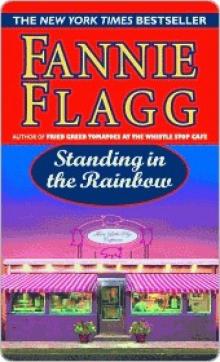 Standing in the Rainbow
Standing in the Rainbow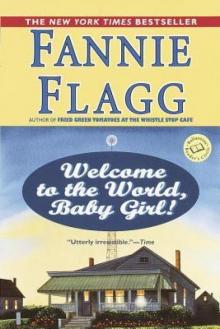 Welcome to the World, Baby Girl!
Welcome to the World, Baby Girl!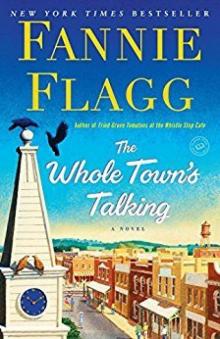 The Whole Town's Talking
The Whole Town's Talking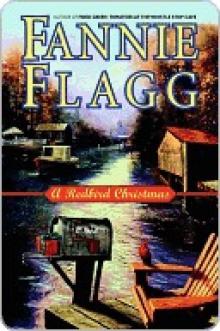 A Redbird Christmas
A Redbird Christmas I Still Dream About You
I Still Dream About You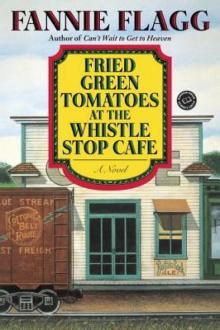 Fried Green Tomatoes at the Whistle Stop Cafe
Fried Green Tomatoes at the Whistle Stop Cafe Can't Wait to Get to Heaven
Can't Wait to Get to Heaven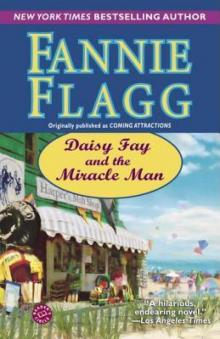 Daisy Fay and the Miracle Man
Daisy Fay and the Miracle Man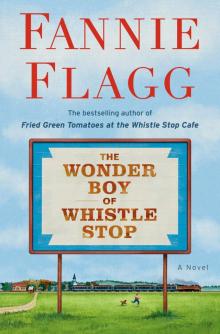 The Wonder Boy of Whistle Stop
The Wonder Boy of Whistle Stop The All-Girl Filling Station's Last Reunion
The All-Girl Filling Station's Last Reunion I Still Dream About You: A Novel
I Still Dream About You: A Novel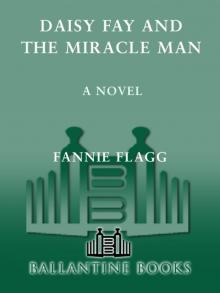 Daisy Fay and the Miracle Man: A Novel
Daisy Fay and the Miracle Man: A Novel